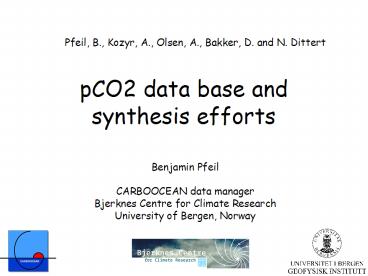pCO2 data base and synthesis efforts PowerPoint PPT Presentation
1 / 26
Title: pCO2 data base and synthesis efforts
1
pCO2 data base and synthesis efforts
Pfeil, B., Kozyr, A., Olsen, A., Bakker, D. and
N. Dittert
- Benjamin Pfeil
- CARBOOCEAN data manager
- Bjerknes Centre for Climate Research
- University of Bergen, Norway
2
Outline
- Data base of public underway data from
CDIAC/CARINA - Data base of CARBOOCEAN and other not yet public
underway data - Combining both data bases
3
Historic underway data was not easy to compare,
because of
- different file formats (txt, xls, csv, tsv, etc)
- metadata was inconsistent (date, time, latitude,
longitude, etc.) - different naming for parameters and for missing
values - different parameters were reported
- derived parameters were reported based on
different calculation - missing parameters!
4
Why doing the job?
- As
- How do you want to compare data if the data was
not calculated the same way? - Now data can be easily combined or queried since
the metadata and parameter are the same - On most important Makes your work easier if you
want to use the data!
5
What data are we talking about?
- All public underway data hosted at CDIAC
- Underway data from CARINA (Carbon dioxide in the
Atlantic Ocean) - Public historic data that was delivered to me
from CARBOOCEAN Pis
6
Total around 300 cruises
- Time frame starting from 1973 - 2005
- Approx. 1.3 million samples with various reported
carbon parameters
7
Overview
8
What corrections have been made to the metadata?
- Interpolation of the position (if missing) and if
it was possible otherwise deleted - Time added e.g. recalcuted from julian day or
0000 for missing time values - Intake depth was added if not reported in the
file either known depth from the vessel/mooring
or 5 m if not reported
9
What corrections have been made to the data?
- During quality controlling data outliers were
found - SST, SSS and atmospheric pressure interpolated
if it was sensible from prior data otherwise
missing value - Carbon data missing value or interpolation
10
Re-calculating the data (done by Are
Olsen)fCO2 in the water column was
re-calculated from
- xCO2 water
- fCO2 water
- pCO2 water
11
How was the fCO2 from xCO2 re-calculated?
- fCO2 in water at SST, 100 humidity was
re-calcuted from - xCO2 in water at SST, dry air
- xCO2 in water at equilibration temperature, dry
air
12
How was fCO2 from fCO2 re-calculated if it was
not reported?
- fCO2 in water at SST, 100 humidity was
re-calcuted from - fCO2 in water at equilibrator temperature, 100
humidity
13
How was fCO2 from pCO2 re-calculated?
- fCO2 in water at SST, 100 humidity was
re-calcuted from - pCO2 in water, at equilibrator temperature, 100
humidity - pCO2 in water, at SST, 100 humidity
14
Note more different pCO2, xCO2 and fCO2
parameter were reported, but ignored if one of
the mentioned ones were also reported
15
How have missing parameters been treated?
- Missing SSS was extracted from World Ocean Atlas
2005 (Antonov et al, 2005) - Missing atmospheric pressure extracted from 6hrly
NCEP/NCAR (Kalnay et al, 1996)
16
How transparent is our work?
- It is very easy for everybody to follow up our
work - since the original data files and the matlab
scripts will be online available - Cruise data consists of the orginal and the
re-calculated data (all in one file) - Detailed metadata documentation for each cruise
is available (total of a few hundred pages) - a report will be published with detailed
information - All data will soon be available at CDIAC
17
Now is
- All the data in the same output format
- All the metadata in the same format
- All derived parameters reported as agreed in
Tsukuba 2004 - Data easily comparable
18
But there are things to be done
- Introducing a systematic naming (expocode) for
all historic cruises - re-calculating athmospheric CO2 parameters
- Including non-European VOS line data (American,
Japanese, Australian) - Further quality controlling of data
19
CARBOOCEAN underway database
- Contains CARBOOCEAN underway data (2005-2007)
- CAVASSOO data
- Data gathered by CARBOOCEAN scientists that is
not yet publically available - More than 1.7 million measurements all in the
same format
20
Overview
21
What happens if you combine the data bases?
- Approx. 3 million measurements
- Atlantic Ocean is best covered (1.6 million
measurements) - Time frame 1972-2007
- Underway data from more than 550 cruises
- All parameters reported to the standards agreed
in Tsukuba 2004 - Detailed metadata for all cruises
22
(No Transcript)
23
(No Transcript)
24
Density of measurements in the North Atlantic
25
Future plans
- Include all public underway data that is
available please release your data to Alex
Kozyr (CDIAC) or me
Just imagine what happens if you combine all the
data that is out there
26
Thank you!

